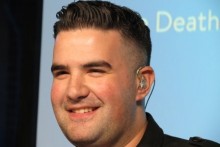Quirky’s CEO Declares Death of the Thermostat—Even the Smart Ones
By João-Pierre S. Ruth November 13, 2014

João-Pierre S. Ruth Despite the hype, widespread adoption of technology for connected homes has thus far been little more than a dream. New York startup Quirky and partner General Electric are on a mission to change that. At a press conference on Tuesday, Ben Kaufman, Quirky’s CEO, unveiled seven new products developed by inventors who brought their ideas to Quirky, a social product-development company. It is part of GE’s and Quirky’s plan to get more connected home products in consumers’ hands. GE was also a significant investor in Quirky’s $ 79 million Series D round last year to fuel this effort. One of the new products, Norm, came with a provocative declaration by Kaufman. “We’re announcing the death of the thermostat,” he said. “Norm is the death of the thermostat.” He dropped some not-so-subtle hints that this included digital smart thermostats. Kaufman did not name names, but the gauntlet was probably intended to be thrown down before Nest and its copycats. In a way, Norm is a smart thermostat, but without its own display. It is a hub that links to sensors installed in the home, letting the user monitor and control temperatures in each room through a smartphone app. The device is due to ship in December and would replace a wall-mounted thermostat. Norm is the invention of Denny Fong, an optometrist from Toronto who came up with other sensor-based products developed and marketed through Quirky. The company invites inventors to submit ideas, which Quirky might help advance to full products. Inventors can sell their products online and through retailers that Quirky has partnerships with. The company and the inventors may collaborate further, with Quirky marketing the products under its brand and sharing profits. Norm, which costs $ 80 per unit, looks like a simple white box and is aesthetically comparable to the Wink Hub, another device available through Quirky. More than a year and a half ago, the company entered into a partnership with General Electric to develop products for connected homes. Quirky also created Wink, a spinoff company that developed a wireless platform for connected devices from many different brands used throughout the home. The Wink Hub and app, which require a smartphone to use, work with connected devices from 25 manufacturers and let people gather history on the activity in their homes. Unlike Norm, the Wink Hub can link with appliances such as connected lights and door locks that are compatible with the app. Kaufman talked up the potential of the Wink app and Norm, but consumers still seem to be on the fence about connected devices for their homes. Beth Comstock, GE’s chief marketing officer, said her company and Quirky have been working to get more people to dive into the connected homes market. The first batch of appliances introduced last year through the partnership included one device that Comstock admitted raised some eyebrows. “‘All that energy for a smart egg tray? Is that really what it’s about?’A lot of people asked that question,” she said. More practical devices have emerged with the Wink platform, Comstock said. The GE Link, a connected LED light bulb, is one prominent product. People can dim or brighten Link bulbs through the Wink app or schedule lights to turn on and off. “About 40 percent of what’s being used on Wink are light bulbs,” she said. There is still a long way to go before the masses embrace connected appliances (if they ever do). GE polled the public, Comstock said, about the Internet of Things—and the results were not terribly encouraging. “The reality is most … Next Page »
UNDERWRITERS AND PARTNERS
Xconomy
(300)


















